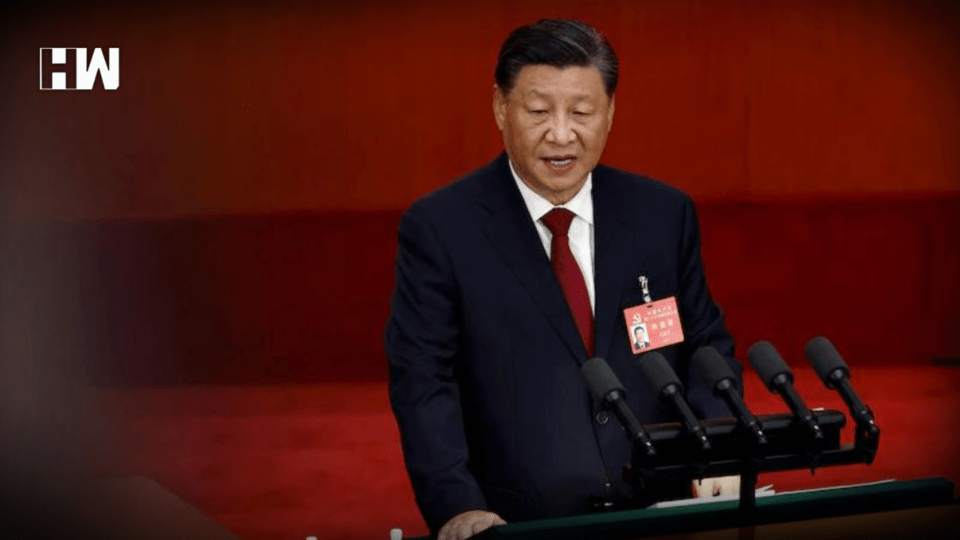Beijing: After securing a third term, Chinese President Xi Jinping and other Chinese leaders’ foremost priority is the reunification of Taiwan, according to Di Valerio Fabbri writing in Geopolitica.info citing analysts.
Some analysts believed that Xi, who had previously yoked his legitimacy to reunification with Taiwan, is bent on realizing this vision. While, in the past, Chinese leaders spoke about reunification as something to be achieved in the long run, it is the number one priority on the agenda these days. China’s pursuit of Taiwan reunification had grown larger with every passing day. While delivering the speech at the 20th Congress of the Communist Party of China (CPC), the Chinese leader warned Taiwan that they would take all necessary measures to deny Taiwanese independence and push through reunification.
Meanwhile, Taiwanese Deputy Foreign Minister, Tien Chung-Kwang reiterated Taiwan’s sovereignty and said that peace and stability in the Taiwan Strait are the responsibility of the two sides and must always be taken care of. Describing the support of international organizations, Tien mentioned that the EU’s support for Taiwan has become increasingly clear in recent years, according to the author.
After the visit of US House Speaker Nancy Pelosi to the island, China’s rhetoric has increased to an unprecedented level, visible by its increased military exercises in the Strait. This move by the Chinese government reaffirmed its ambitious plan of reunifying Taiwan.
Last year, the Chinese leader signed a directive allowing ‘non-war’ uses of the military, instilling fear that China may use weapons to invade Taiwan under the guise of a ‘special military operation’.
Recently, China changed the military guard of the eastern theatre and promoted General He Weidong, a former head of the Eastern Theatre Command, to become the new second-ranked vice-chairman of the Chinese Military Commission.
This new move is also seen as a step towards the reunification of Taiwan. At the same time, China’s support for Russian President Vladimir Putin’s invasion, while also ratcheting up pressure on Taiwan, projects greater confidence and military force.
It is ironic that despite increased interest in the international community regarding Taiwan, there is continued reluctance to challenge Beijing directly. Recently, Taiwan was denied observer status for the 90th INTERPOL General Assembly.
During a press conference, Interpol Secretary General Jurgen Stock said, “In 1984 Interpol general assembly recognised the People’s Republic of China as a sole representative of China. As such Interpol recognises Taiwan as part of China and as China is a member of Interpol, it can’t grant Taiwan observer status at Interpol general assembly.”
This is not the only international body which has denied Taiwan observer status. Earlier this year, Taiwan had requested to participate as an observer in the World Health Assembly (WHA), the decision-making body of the World Health Organization. However, the island nation was excluded from the conference for the sixth straight year in 2022 as the Chinese government has been blocking Taiwan’s representation. At the same time, Taiwan Strait tensions are at their highest in decades, as China attempts to get Taipei to acquiesce to Xi Jinping, Geopolitica.info reported.
Also Read: 2012 Chhawla Rape Case: SC Acquits Three Rapist-Killers Called “Predators” By HC
The outlines are supposed to standardize and provide the legal basis for Chinese troops to carry out missions like disaster relief, humanitarian aid, escort, and peacekeeping, and safeguard China’s national sovereignty, security and development interests. The outlines aim to prevent and neutralize risks and challenges, handle emergencies, protect people and property, and safeguard national sovereignty, security and development interests, and world peace and regional stability. Prima facie this set of principles suggests diversification of the PLA’s operational duties to non-traditional areas of security, apart from its regular duties of fighting a war. However, this does not in any way reduce the possibility of the no-war doctrine being used to invade Taiwan by virtue of non-traditional means, including cyber security and psychological means, reported Geopolitica.info.
(Except for the headline, this story has not been edited by HW News staff and is published from a syndicated feed.)
As an independent media platform, we do not take advertisements from governments and corporate houses. It is you, our readers, who have supported us on our journey to do honest and unbiased journalism. Please contribute, so that we can continue to do the same in future.

